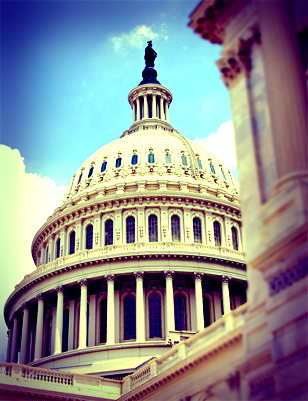
In most parts of the United States, the period of time between Thanksgiving and Christmas is known as "the holiday season", a time for shopping, decorating, and getting together with family, friends, and coworkers. On Capitol Hill, on the other hand, it is a time for deal-making, when last-minute bills are thrown together so that members and staff can get to "adjournment", the break between sessions (we are in the first session) or congresses (this is the 115th).
That time has come, on schedule.
There are generally two adjournments this time of year, the "target" adjournment and the "actual" adjournment. For example, at the beginning of the Congress, the House Majority Leader generally issues a calendar for each of the two sessions of the congressional term. That calendar will list an adjournment date, the last "session day" of the year, for each session. In 2017, that "target" adjournment date is December 14.
Some years Congress hits the target, and some years it does not, leaving either earlier or later than scheduled. Usually, it is the year-end "spending bill" (also known as a "budget deal" or a "consolidated appropriations act" or an "omnibus") that holds up the process. The other bills usually get caught up in (or pushed out by) its wake.
As I mentioned in an earlier post, the current government spending bill expires on December 8, 2017. Why that date? It was set in the "Continuing Appropriations Act, 2018 and Supplemental Appropriations for Disaster Relief Requirements Act, 2017", Pub. L. 115-56, 131 Stat. 1129 (2017). If you take a look at that law (which was passed on September 8, 2017), while it purports to make "continuing appropriations for the fiscal year ending September 30, 2018," it really extends the debt limit to December 8, 2017, and continues appropriations to that date. It resulted from a deal between President Trump and Senate Minority Leader Chuck Schumer and House Minority Leader Nancy Pelosi, to which Senate Majority Leader Mitch McConnell and House Speaker Paul Ryan were initially opposed.
Congress still has a lot to do in this session. It is grappling with passing a tax reform bill (or not) before it can get to the spending bill. Fixes to Obamacare are also under consideration. The president and some members want more hurricane relief money. And then, there is immigration.
Democrats have been threatening to withhold support for any spending bill until a so-called "DACA fix" is passed to regularize the status of the 690,000 aliens who are currently covered by Deferred Action for Childhood Arrivals (DACA). In early November, more than a dozen Republicans also went on the record demanding such legislation by the end of the year, although none of the current DACA recipients will be in danger of losing their status until at least March.
A meeting had been scheduled for yesterday between the president, McConnell, Ryan, Pelosi, and Schumer, at which these issues and others were to be discussed. The Democrats, however, pulled out of that meeting after the president tweeted:
Meeting with “Chuck and Nancy” today about keeping government open and working. Problem is they want illegal immigrants flooding into our Country unchecked, are weak on Crime and want to substantially RAISE Taxes. I don’t see a deal!
— Donald J. Trump (@realDonaldTrump) November 28, 2017
The White House is decorated for the holidays, and the Capitol Christmas tree is in place, ready to be lit on December 6. But the real sign of the season is the action taking place inside the six congressional office buildings, and the big one in the middle.
